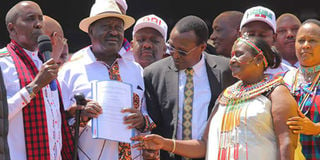Ruto allies skip BBI rally as bid for regional units dismissed

Kajiado Governor Joseph ole Lenku presents a document containing issues the Maasai community wants addressed to ODM leader Raila Odinga during a BBI rally at Ole Ntimama Stadium in Narok on February 22, 2020. PHOTO | GEORGE SAYAGIE | NATION MEDIA GROUP
What you need to know:
- Instead of a three-tier government, the Maa community wants the strengthening of the regional economic blocs, which have already kicked off.
- Mr Odinga said the country was big enough for all to feel part of the government and vowed to protect the interests of all Kenyans.
Politicians allied to Deputy President William Ruto skipped the Building Bridges Initiative (BBI) rally in Narok Town on Saturday, where seven counties presented their proposals.
Leaders from the Kipsigis community in Narok County made good their Friday threat to keep away from the fifth BBI consultative rally at the William ole Ntimama Stadium.
On Friday, they had stormed out of the consultative meeting attended by over 1,000 delegates at the Maasai Mara University.
Led by Emurua Dikirr MP Johana Ng’eno and Narok Deputy Governor Evalyn Aruasa, they walked out over what they termed tribal profiling.
Some of the leaders then took to social media to demonise the BBI report, saying it was being used to sow discord and hate in the country.
Among those who attended the Narok rally were ODM party leader Raila Odinga, ANC leader Musalia Mudavadi, Ford Kenya’s Moses Wetang’ula, more than 20 governors allied to President Uhuru Kenyatta and Mr Odinga and over 50 MPs and senators.
REGIONAL GOVERNMENTS
Mr Odinga told off critics keen to derail the BBI initiative since “the train has already left the station”.
Mr Odinga said the report would address various issues, including land reforms, election malpractices, corruption and an economic revolution to rescue the youth from unemployment.
“We are agitating on how the country will be governed, and those who are dwelling on tribal lines will be left behind. They must come out of their cocoons and join this agenda of forming a new Kenya,” said Mr Odinga.
He spoke after the Maasai community said a resounding 'No' to the formation of regional governments.
The proposals were handed over to Mr Odinga by the three governors from Maasai-speaking counties — Moses Kasaine (Samburu), Samuel Tunai (Narok), and Joseph ole Lenku (Kajiado), who is the Maasai counties BBI coordinator, together with 15 MPs and senators from the community.
They said regional governments would be an extra cost to the taxpayer and would water down the gains already made since the advent of devolution.
STRENGTHEN DEVOLUTION
The Maasai leaders said their proposals had been vetted by all elected leaders and 18 stakeholder groups from six counties.
They reiterated that more devolved units would be costly and would leave some communities disentangled from their counties.
The rejection of the proposal for regional governments is the first since the BBI rallies across the regions started and sent a strong indicator that the proposals in the first BBI report could be modified to accommodate views from minority groups.
Instead of a three-tier government, the Maa community wants the strengthening of the regional economic blocs, which have already kicked off.
“The Maa nation wants economic devolution and not political devolution. We already have counties, which have started off well and visible development has begun to be experienced,” said Mr Ole Lenku.
The governor said the consultative meetings that bore the proposals had demanded an increase in devolution money. “We greatly support the 45 per cent of the national budget going to devolved units,” said the governor.
MAA ISSUES
The debate on regional governments and the need for inclusion at the top ignited talk that drew in other leaders present, who supported inclusion of minority groups in government.
Mr Odinga said the country was big enough for all to feel part of the government and vowed to protect the interests of all Kenyans.
He acknowledged that the Maa community had been subjected to dispossession of land by settlers and called for respect of native communities by those who settle among them.
Narok Senator Ledama ole Kina said the hospitality of the Maasai had been abused and demanded that the law must be followed by those buying land in Maasai land.
“Maasai issues will be better articulated by Maasais and I am not going to apologise for that,” said the senator, who said he would not recognise other communities living in the county when it come to the articulation of Maasai issues.
The senator said the Narok meeting would only address issues affecting Maa counties, which he alleged have been “terrorised and stigmatised” for a long time.
LAND OWNERSHIP
His utterance attracted reaction from a section of Rift valley leaders, among them Nakuru Governor Lee Kinyanjui, who said the utterances in relation to non-indigenous land owners and reclaiming of land across three counties were retrogressive and ill-informed.
Mr Kinyanjui said the right to ownership of property in any part of the country was guaranteed by the Constitution and was not a gift from politicians.
“It is most unfortunate that such sentiments come at a time when the nation is seeking to heal the wounds of intolerance and political incitement,” said Mr Kinyanjui.
Narok MP Moitalel ole Kenta said President Uhuru Kenyatta and Mr Odinga should continue agitating for peace, unity, economic empowerment, political stability and inclusivity.
Kirinyaga Governor Anne Waiguru called for the inclusion of all communities in the structure of government, saying time had come to expand the Executive to accommodate all Kenyans.





